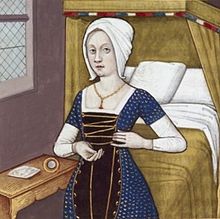
In Greek mythology, Argia /ɑːrˈdʒaɪə/ or Argea /ɑːrˈdʒiːə/ (Ancient Greek: Ἀργεία Argeia) was a daughter of King Adrastus of Argos, and of Amphithea, daughter of Pronax. She was married to Polynices, the exiled king of Thebes, and bore him three sons: Thersander, Adrastus, and Timeas.
Mythology

When Oedipus had died at Thebes, Argia came with others to the funeral of Oedipus, her father-in-law.
Middle Age tradition
She is remembered in De Mulieribus Claris, a collection of biographies of historical and mythological women by the Florentine author Giovanni Boccaccio, composed in 1361–62. It is notable as the first collection devoted exclusively to biographies of women in Western literature.
In Dante's Inferno, she is found in Limbo.
See also
- Phoenician Women
- Hyginus, who in his Fabulae (Latin) calls her Argia.
- Robert Graves in his popular The Greek Myths (106c) prefers the spelling Aegeia.
- Euripides in The Phoenician Women and Suppliants, who mentions the wedding without giving her name.
Notes
- Hyginus, Fabulae 69 - 70
- Pausanias, Description of Greece, 2.20.5
- Pseudo-Apollodorus, Bibliotheca 1.9.13 & 3.6.1
- Hesiod, Catalogue of Women fr. 99a
- Scholiast on Homer, Il. xxiii. 679; Hesiod. Catalogue of Women Fragment 24.
- Boccaccio, Giovanni (2003). Famous Women. I Tatti Renaissance Library. Vol. 1. Translated by Virginia Brown. Cambridge, MA: Harvard University Press. p. xi. ISBN 0-674-01130-9.
References
- Apollodorus, The Library with an English Translation by Sir James George Frazer, F.B.A., F.R.S. in 2 Volumes, Cambridge, MA, Harvard University Press; London, William Heinemann Ltd. 1921. ISBN 0-674-99135-4. Online version at the Perseus Digital Library. Greek text available from the same website.
- Gaius Julius Hyginus, Fabulae from The Myths of Hyginus translated and edited by Mary Grant. University of Kansas Publications in Humanistic Studies. Online version at the Topos Text Project.
- Hesiod, Catalogue of Women from Homeric Hymns, Epic Cycle, Homerica translated by Evelyn-White, H G. Loeb Classical Library Volume 57. London: William Heinemann, 1914. Online version at theio.com
- Pausanias, Description of Greece with an English Translation by W.H.S. Jones, Litt.D., and H.A. Ormerod, M.A., in 4 Volumes. Cambridge, MA, Harvard University Press; London, William Heinemann Ltd. 1918. ISBN 0-674-99328-4. Online version at the Perseus Digital Library
- Pausanias, Graeciae Descriptio. 3 vols. Leipzig, Teubner. 1903. Greek text available at the Perseus Digital Library.
- Publius Papinius Statius, The Thebaid translated by John Henry Mozley. Loeb Classical Library Volumes. Cambridge, MA, Harvard University Press; London, William Heinemann Ltd. 1928. Online version at the Topos Text Project.
- Publius Papinius Statius, The Thebaid. Vol I-II. John Henry Mozley. London: William Heinemann; New York: G.P. Putnam's Sons. 1928. Latin text available at the Perseus Digital Library.
- Statius, Thebais IV.187–213
This article relating to Greek mythology is a stub. You can help Misplaced Pages by expanding it. |